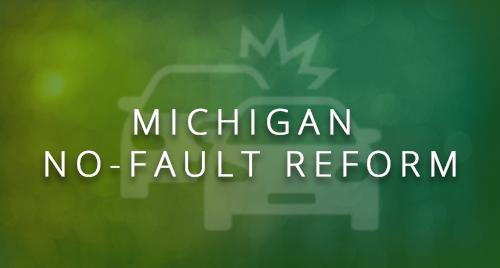
- posted: Aug. 03, 2023
- BRM Attorneys, Personal Injury, Michigan No Fault, Insurance Defense, No Fault Reform, Troy Michigan Defense Firm, Personal Injury Defense Attorneys, Legal Update, Insurance Coverage, Insurance Coverage Litigation, Michigan Insurance Coverage Attorney, Michigan Supreme Court
Authors: Adrienne L. Hayes and Redon Ipeku
Michigan Supreme Court Rules No-Fault Amendments Do Not Apply Retroactively
On July 31, 2023, the Michigan Supreme Court ruled on the applications for leave filed in two no-fault cases, Ellen Andary v USAA Casualty Insurance Company and Philip Krueger v Citizens Insurance Company of America.
In a 5-2 opinion, the Michigan Supreme Court held that the 2019 No-Fault Amendments involving the new fee schedules in MCL 500.3157(7) and the new attendant care limitations in MCL 500.3157(10) do not modify or cap the benefits available to claimants who were injured in auto accidents before the enactment of 2019 PA 21, even if the medical services following pre-reform accidents were rendered after the enactment of 2019 PA 21. As part of its decision, the Supreme Court also acknowledged that curbing escalating PIP benefits costs and lowering insurance premiums are still legitimate governmental objectives, and the new fee schedules contained in MCL 500.3157(7) are reasonably and rationally related to accomplishing these objectives.
DECISION AND ORDER:
Ellen Andary v USAA Casualty Insurance Company
Phillip Krueger et al v Citizens Insurance Company of America
Retroactivity of the 2019 No-Fault Amendments
The Supreme Court held that the 2019 amendments to MCL 500.3157 and MCL 500.3157(10) of the No-Fault Act did not retroactively modify uncapped lifetime benefits provided by an automobile insurance policy in accidents that occurred before June 11, 2019, the general effective date of the 2019 reforms. The Supreme Court indicated that the Legislature did not clearly state that it intended the new fee schedules in MCL 500.3157(7) or the new attendant care limitations in MCL 500.3157(10) to apply retroactively to individuals with a vested contractual right to PIP benefits under the pre-amendment no-fault statutes. According to the Supreme Court, there is nothing in the clear language of MCL 500.3157, as amended by 2019 PA 21, suggesting an intent to modify the contractual rights of an injured individual who had uncapped PIP benefits, as well as family-provided attendant care, that vested prior to the enactment of the amendments (i.e., that the amendments apply retroactively).
The Supreme Court found the plaintiffs’ rights to PIP benefits vested at the time of the automobile accident causing their injuries. Accordingly, the Court found the date of the auto accident, rather than the date that medical treatment is rendered, to be the first factor to consider to determine whether the new fee schedules and attendant care limitations apply under the Amendment.
The New Fee Schedules Contained in MCL 500.3157(7) Pass the Rational Analysis Test
The Supreme Court also analyzed a medical provider’s Due Process and Equal Protection challenges on the prospective application of MCL 500.3157(7). The Eisenhower Center, a facility specializing in rehabilitative care for individuals who have suffered traumatic brain injuries, alleged that MCL 500.3157(7) made it financially impossible for it to continue running its current business model. The Court rejected the argument, finding that the provider had no fundamental right to continue a business model which was free from government regulation. In other words, medical providers have no constitutionally protected rights to charge exorbitant fees for their services at the expense of their patients, even if the fees were part of their business model.
The Supreme Court also analyzed the equal protection challenge to MCL 500.3157(7) under a rational basis standard, the default standard for social and economic legislation. The Supreme Court held MCL 500.3157(7) passed the rational basis standard, emphasizing that a key goal of the 2019 No-Fault reforms was to drive down premiums for all operators of automobiles in Michigan and to curb exploitative billing by medical providers. As such, in seeking to reduce costs, the Legislature had at least a rational basis for treating reimbursement rates for Medicare compensable services differently than those services which were not covered by Medicare.
The Court Emphasized PIP Benefits Have Both Statutory and Contractual Characteristics
The Supreme Court found that, although the No-Fault Act mandates that certain minimum benefits be provided in private insurance policies, that does not mean benefits available under a contractual policy of no-fault automobile insurance are purely statutory. While an automobile insurance policy must provide at least the minimum PIP benefits required under the Act, the insurance policy controls optional benefits not required by the act. In that sense, the Supreme Court indicated that the plaintiffs’ preexisting rights to receive uncapped PIP benefits were both statutory and contractual.
The Court’s rationale recognized that auto insurers may elect to provide more benefits than what is required by the No-Fault Act as long as the insurer provides the minimum PIP benefits required by the law. For example, auto insurers may provide Uninsured Motorist coverage, though that coverage is not compulsory under the act.
What does all of this mean?
It means that the 2019 No-Fault Amendments to MCL 500.3157 and MCL 500.3157(10) do not modify or cap the benefits available to claimants who were involved in auto accidents that took place before June 11, 2019. This applies to the (uncapped) PIP benefits available under the pre-reform provisions of the No-Fault Act. The Court explained that, at the earliest, the amendments apply to individuals who were injured while covered by an insurance policy issued on or after June 11, 2019. At the latest, the amendments apply to individuals injured while covered by an insurance policy issued after July 1, 2020, that incorporated the requirements of the 2019 amendments. Although the fee schedule does not apply for medical services not affected by the amendments as indicated by the Court, medical providers must still prove the costs for their medical services were reasonable and necessary.
At Bowen, Radabaugh & Milton, P.C. we offer a wide range of legal services to insurance carriers.
For more information about the Michigan No-Fault Act and application of the amendments, contact us by phone at 248.641.8000, or by email at [email protected]



